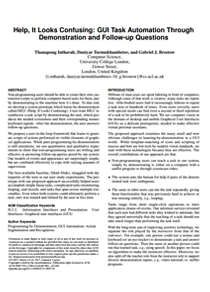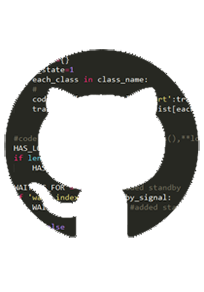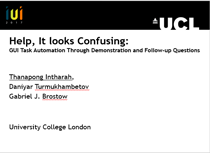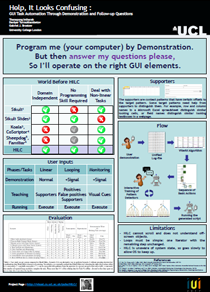Help, It Looks Confusing: GUI Task Automation
Through Demonstration and Follow-up Questions
and
University College London
Non-programming users should be able to create their own customized scripts to perform computer-based tasks for them, just by demonstrating to the machine how it's done. To that end, we develop a system prototype which learns-by-demonstration called HILC (Help, It Looks Confusing). Users train HILC to synthesize a task script by demonstrating the task, which produces the needed screenshots and their corresponding mouse-keyboard signals. After the demonstration, the user answers follow-up questions.
We propose a user-in-the-loop framework that learns to generate scripts of actions performed on visible elements of graphical applications. While pure programming-by-demonstration is still unrealistic, we use quantitative and qualitative experiments to show that non-programming users are willing and effective at answering follow-up queries posed by our system. Our models of events and appearance are surprisingly simple, but are combined effectively to cope with varying amounts of supervision.
The best available baseline, Sikuli Slides, struggled with the majority of the tests in our user study experiments. The prototype with our proposed approach successfully helped users accomplish simple linear tasks, complicated tasks (monitoring, looping, and mixed), and tasks that span across multiple executables. Even when both systems could ultimately perform a task, ours was trained and refined by the user in less time.
BibTeX
@inproceedings{IntharahHILC2017,
author = {Intharah, Thanapong and Turmukhambetov, Daniyar and Brostow, Gabriel J.},
title = {Help, It Looks Confusing: GUI Task Automation Through Demonstration and Follow-up Questions},
booktitle = {Proceedings of the 22nd International Conference on Intelligent User Interfaces},
series = {IUI '17},
year = {2017},
location = {Limassol, Cyprus},
publisher = {ACM},
}
Acknowledgements
We thank all the volunteers, and all reviewers, who provided helpful comments on previous versions of this paper. Authors gratefully acknowledge the Ministry of Science and Technology of Thailand Scholarship and the EPSRC grants EP/K023578/1 and EP/K015664/1.

 PDF
PDF
 Code
Code
 Presentation Slides
Presentation Slides
 Poster
Poster
